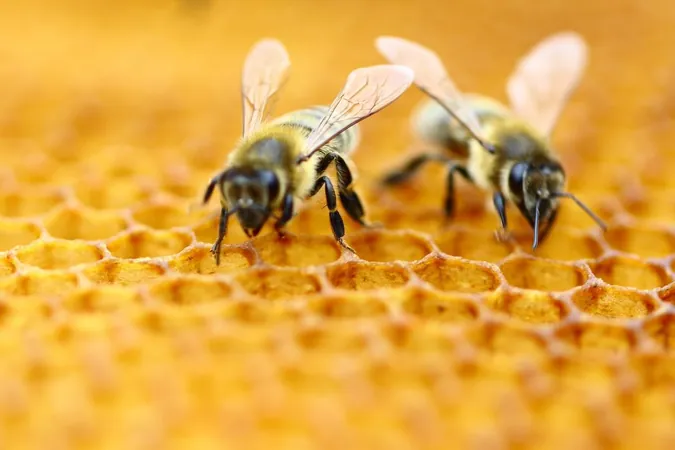
The Surprising Link Between Bee Nutrition and Their Survival Against Pesticides and Viruses
2024-09-30
Author: Nur
Introduction
A groundbreaking study from the University of Illinois Urbana-Champaign has unveiled critical insights into the health of honey bees, shedding light on the alarming decline in pollinator populations. Researchers have long speculated that a combination of environmental stressors, including nutritional deficiencies, pesticide exposure, and viral infections, have been driving this decline. However, this recent investigation marks the first time these three factors have been studied in unison, with astonishing results that underscore the significance of nutrition in bee resilience.
Research Leadership
Edward Hsieh, the graduate student spearheading the research alongside Professor Adam Dolezal, emphasized the multifaceted nature of these interactions. "Multiple stressors are often detrimental to survival," Hsieh stated. "However, the effects vary depending on the context, which makes it crucial to consider all factors when assessing their impact on honey bees."
Methodology
The study, published in the journal Science of the Total Environment, carefully examined pollen samples gathered by honey bees from restored prairie lands adjacent to agricultural zones in Iowa. Using levels of insecticides and fungicides found in these grains, the researchers were able to simulate real-world chemical exposure conditions.
Experimental Setup
The investigation involved caged honey bees subjected to various combinations of dietary, viral, and chemical treatments, including widely used pesticides such as organophosphates, pyrethroids, and neonicotinoids. Some bees were also infected with the Israeli Acute Paralysis Virus (IAPV), a known killer of bee populations.
Findings
Findings revealed alarming trends: bees consumed artificial pollen exhibited high mortality rates when faced with IAPV, especially when combined with pesticide exposure. Intriguingly, bees fed with natural pollen showed a similar response to viral infections, but their mortality rates upon exposure to the detrimental pesticides were significantly lower than their counterparts.
Expert Insights
"The inherent ability of bees to withstand stress plays a role here," explained Professor Dolezal. "A mild pesticide exposure might help them cope better with a significant threat like a virus, but this only holds true if they have access to proper nutrition."
Cautionary Notes
Despite these promising insights about the resilience afforded by nutrition, researchers cautioned against downplaying the threat posed by pesticides. They highlighted that different chemicals can elicit varying responses, suggesting that altering any one factor in the bee ecosystem could lead to dire consequences.
Conclusion
Dolezal's takeaway from the study is both hopeful and cautionary: "Bees can withstand interactions between pesticides and viruses if provided with excellent nutrition. Nonetheless, this should not lead to complacency regarding pesticide use. We need to be vigilant to ensure the survival of these essential pollinators."
Implications for Agriculture and Ecology
The implications of this study extend far beyond academic curiosity; they usher in a renewed conversation around sustainable farming practices, the importance of biodiversity, and the urgent need to protect our bees for the sake of global agriculture and ecological balance. The future of our ecosystems could very well hinge on our understanding of these interactions and the actions we take to safeguard pollinator health.
Call to Action
Stay tuned for more updates on bee research and how we can protect these vital creatures!



 Brasil (PT)
Brasil (PT)
 Canada (EN)
Canada (EN)
 Chile (ES)
Chile (ES)
 España (ES)
España (ES)
 France (FR)
France (FR)
 Hong Kong (EN)
Hong Kong (EN)
 Italia (IT)
Italia (IT)
 日本 (JA)
日本 (JA)
 Magyarország (HU)
Magyarország (HU)
 Norge (NO)
Norge (NO)
 Polska (PL)
Polska (PL)
 Schweiz (DE)
Schweiz (DE)
 Singapore (EN)
Singapore (EN)
 Sverige (SV)
Sverige (SV)
 Suomi (FI)
Suomi (FI)
 Türkiye (TR)
Türkiye (TR)